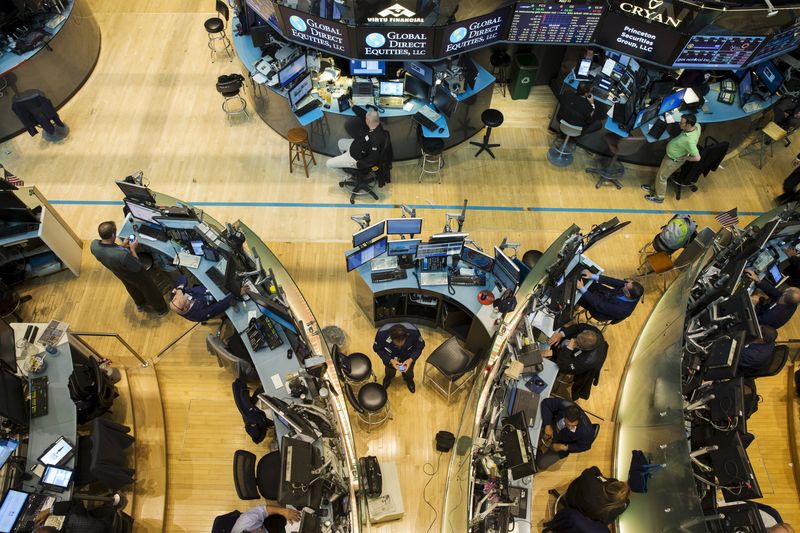By Geoffrey Smith
Investing.com -- The U.S. updates on personal spending and income for January, along with the Federal Reserve's favorite inflation measure - the price index for Personal Consumer Expenditures. A bunch of Fed speakers get to give their two cents' worth in the hours that follow. China publishes its proposals to bring peace to Ukraine, but its proposals are likely to be unacceptable to Kyiv. The U.S. announces more military aid for the beleaguered country. Warner Bros. Discovery disappoints with its quarterly earnings, but Beyond Meat jumps after narrowing its losses. The German economy shrunk by more than thought in the fourth quarter, ending what was, for some German companies, a disastrous 2022. Here's what you need to know in financial markets on Friday, 24th February.
1. PCE prices and a hatful of Fed speakers
The spotlight is on inflation again at 08:30 ET (13:30 GMT), as the U.S. releases price data for personal consumer expenditures in January. The PCE deflator – the Federal Reserve's preferred inflation measure – is in sharp focus after GDP numbers on Thursday included an upward revision to PCE prices, indicating that inflation had been stronger than thought in the fourth quarter.
At the same time, there will be figures on personal income and spending, while new home sales data for January and the Michigan Consumer Sentiment survey will follow at 10:00 ET.
The numbers will be followed by a barrage of speeches from Fed officials. Governor Philip Jefferson and Cleveland Fed President Loretta Mester will open the ball at 10:15 ET, Governor Chris Waller and Boston Fed Governor Susan Collins appear on the same panel at 13:30 ET,
2. China's peace plan seen stillborn on anniversary of Russian invasion
On the first anniversary of Russia's invasion of Ukraine, China presented a 12-point plan aimed at ending the war. The plan seemed destined to be rejected by Kyiv and its western backers, given that it proposed a ceasefire that would effectively cement Russia's annexation of four Ukrainian regions last year, as well as demanding an end to "unilateral" sanctions (i.e., western sanctions on Russia).
The U.S. administration marked the anniversary by approving another $2 billion in military aid to Ukraine, including drones and anti-drone defenses, electronic warfare detection equipment and ammunition for its artillery and rocket systems.
The U.K. and U.S. also announced new sanctions against hundreds more Russian officials and entities, including measures that will sharply increase the cost of aluminum smelted in Russia. Aluminum futures fell 1.0% in London to a seven-week low.
3. Stocks set to open lower, but all eyes on PCE; WBD slumps, BYND jumps
U.S. stock markets are set to open in a state of suspended animation, with all eyes on the PCE data and its implications for further Fed action. An upside surprise to forecasts of a 0.1% gain (and 0.4% for core prices) may push investors' expectations of the Fed's peak rate higher, with negative effects on stock valuations.
Earnings season continues on its merry way in the meantime. Stocks in focus on Friday are likely to include Warner Bros. Discovery (NASDAQ:WBD) after it missed forecasts for revenue and subscriber growth in the fourth quarter and warned that advertising sales remain weak. WBD stock fell 5% in premarket. Booking (NASDAQ:BKNG) stock is also down after giving a muted forecast for the current year, despite beating expectations for the last quarter.
Going the other way in premarket is Beyond Meat (NASDAQ:BYND), up 12.6% after narrowing its loss in the last quarter.
By 06:30 ET, Dow Jones futures were down 140 points or 0.4%, while S&P 500 futures were down 0.5% and Nasdaq 100 futures were down 0.8%.
4. Europe struggles with war impact
The German economy shrunk by 0.4% - twice as much as first estimated – in the final quarter of last year, providing a reality check to those who think that the Eurozone is out of the woods.
The war in Ukraine is leaving particularly deep scars in the country's industrial heartland: BASF (ETR:BASFN), Europe's largest chemicals company, said it will close an ammonia plant and end production of some organic chemicals in Germany after it lost €4.8B last year.
The figures not only reflect a massive rise in input cost, but also billions of euros of write-offs of its Russian investments, which included the two Nord Stream pipelines.
Consumer confidence, however, continued to improve both in Germany and in the U.K. as the sense of panic over retail energy costs subsided.
5. Oil still adrift; rig count, CFTC data due
Crude oil prices are poised to end the week down only fractionally, as reports of lower output in Russia continue to be balanced by rising inventories in the U.S.
By 07:25 ET, U.S. crude prices were up 0.7% at $75.91 a barrel, while Brent was up 0.7% at $82.81 a barrel.
Natural gas futures were up 2.26% at $2.48 per mmBtu after the excitement of a winter storm that brought heavy snow as far as southern California. Baker Hughes rig count – in decline since November – and the CFTC's net speculative positioning data round off the week later.
